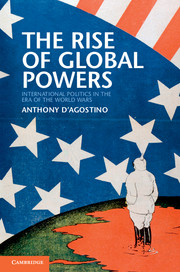Book contents
- Frontmatter
- Contents
- Maps
- Acknowledgements
- Introduction
- 1 The great powers at the dawn of world politics
- 2 Global origins of World War I: from the China scramble to the world crisis of 1904–1906
- 3 Global origins of World War I: a chain of revolutionary events across the world island
- 4 Balance and revolution, 1914–1918
- 5 A ragged peace, 1919
- 6 Scramble for Eurasia, 1919–1922
- 7 Drastic acts of unhappy powers, 1922–1923
- 8 Storms in the lull, 1924–1927
- 9 Politics and economics of the great slump, 1928–1933
- 10 A vogue for national economy
- 11 Mussolini’s moment, 1933–1935
- 12 The global civil war, 1936–1937
- 13 Last years of peace, 1937–1939
- 14 The European war, 1939–1941
- 15 The world war
- 16 Balance and hegemony
- Maps
- Notes
- Index
4 - Balance and revolution, 1914–1918
Published online by Cambridge University Press: 05 June 2012
- Frontmatter
- Contents
- Maps
- Acknowledgements
- Introduction
- 1 The great powers at the dawn of world politics
- 2 Global origins of World War I: from the China scramble to the world crisis of 1904–1906
- 3 Global origins of World War I: a chain of revolutionary events across the world island
- 4 Balance and revolution, 1914–1918
- 5 A ragged peace, 1919
- 6 Scramble for Eurasia, 1919–1922
- 7 Drastic acts of unhappy powers, 1922–1923
- 8 Storms in the lull, 1924–1927
- 9 Politics and economics of the great slump, 1928–1933
- 10 A vogue for national economy
- 11 Mussolini’s moment, 1933–1935
- 12 The global civil war, 1936–1937
- 13 Last years of peace, 1937–1939
- 14 The European war, 1939–1941
- 15 The world war
- 16 Balance and hegemony
- Maps
- Notes
- Index
Summary
We are not accustomed to think of the war of 1914–18 as a great victory over absolutism, as in the slogan under which the United States entered the war, “to make the world safe for democracy.” Rather we see it as an unmitigated catastrophe, a ghastly apocalypse that consumed the lives of millions. Four absolute monarchies – the Hohenzollern, Habsburg, Romanov, and Ottoman – were destroyed, and the winners so shattered by their victory that they stumbled subsequently down a slope of decline on which World War II was only a station. No one really wins wars, we might think, weighing the suffering of those who experienced the conflict. After we have paid our respects to the profundity of this thought, however, we have to ask whether the Great War did despite everything have winners both from the standpoint of geopolitical gains for the victor states and from that of the progress of ideas. The empires of the victors greatly augmented their territorial reach and freed themselves of the competition of rivals. The “autocratic and expansionist” absolute monarchies which Secretary Lansing called the great threat of the future were, except for Japan, completely ruined. The model of the Modernizing Old Regime was replaced by that of the multiparty democracy in new states organized as much as possible according to national self-determination. In effecting these changes the war was also a multifaceted revolution. And the great powers, pursuing their own war aims, were in fact eager participants in this revolution.
The winning powers did not win the way they thought they would. At the outset, some of their leaders feared the catastrophe that might result from a long war. Most expected a short war like the ones in their recent memory. This would have been a war to redress the European balance of power with some resultant changes in other parts of the world. In a short war, the United States would not have taken part and Russia would not have collapsed in revolution. Both these states at war’s end were in their different ways openly opposed to the very idea of the balance of power, along with all the other cherished nineteenth-century notions of international life. Bolshevism, fascism, and new states in East Central Europe and the Middle East were effects of the war that may have had some origins in the prewar period, but could not have been foreseen with clarity. The wonder is that the winners managed to navigate uncharted seas and pursue their national aims through all of it.
- Type
- Chapter
- Information
- The Rise of Global PowersInternational Politics in the Era of the World Wars, pp. 77 - 111Publisher: Cambridge University PressPrint publication year: 2011



